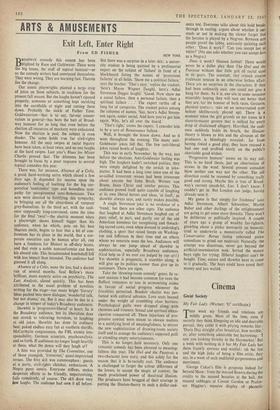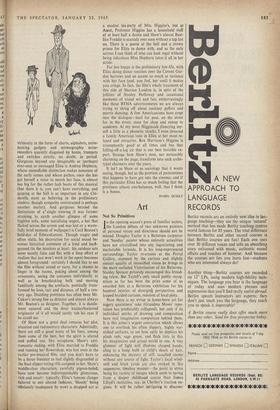Cinema
Great Society My Fair Lady. (Warner; 'U' certificate.) rrixis week my friends and relations are I mildly green. Most of the time, even if secretly they think filmgoing an idle and desirable pursuit, they cover it with pitying remarks like: 'Doris Day straight after breakfast, how terrible,' or, after something admirable but harrowing: '1 saw you looking blotchy in the Haymarket.' But a week with nothing in it but My Fair Lady has them frankly envious and wistful : oh the fun and the high jinks of being a film critic, they say, in a week of such undiluted gorgeousness and merriment.
George Cukor's film is gorgeous indeed far beyond Shaw : from the massed flowers during the credits to the massed beauties at the ball, the massed cabbages at Covent Garden or Profes- sor Higgins's massive display of phonetic
virtuosity in the form of charts, alphabets, noise- making gadgets and seismographic noise- recorders quaintly disguised by horns, trumpets and switches strictly, no doubt, in period. Gorgeous beyond any imaginable or (perhaps) ever-seen or envisaged Eliza is Audrey Hepburn, whose unsnuffable distinction makes nonsense of the early scenes and whose pathos, once she has got herself a voice to match her face, is almost too big for the rather lush boots of this musical (but there it is, you can't have everything, and gasping at the ball is as important in any Cin- derella story as believing in the preliminary cinders; though sympathy overstrained is perhaps another matter). And gorgeous beyond the limitations of a" single viewing (I was forever straining to catch another glimpse of some fugitive sofa, some tantalising teapot, a hat that flicked across the screen and was lost or a waste- fully brief moment of wallpaper) is Cecil Beaton's field-day of Edwardianism. Though stagey and often static, his decoration for social mood be- comes historical comment of a kind and back- ground (in the interiors at least: his outdoor sets seem mostly false and flat with a limp effort at realism that just won't work in the open) becomes almost foreground: certainly I should like to see the film without sound or story, for a chance to linger in the rooms, poking about among the ornaments, seeing the costumes individually as well as in breathtaking bulk and moving familiarly among the artefacts, poetically trans- formed by love, tact and distance, of half a cen- tury ago. Dazzling prettiness has often been Mr. Cukor's strong line as director and almost always Mr. Beaton's as designer. Together, it is dazzle- ment squared and the dour knickerbockered originator of it all would surely rub his eyes if he could see.
Of Shaw not a great deal remains but plot, situation and rudimentary characters. Admittedly, there are still a good many of his lines, among them some of the best, but the spirit is altered and puffed out, like ectoplasm. Shaw's anti- romantic ending, with Eliza married to Freddie and running her flowershop, was lost even in the earlier pre-musical film, and you don't have to be a fierce feminist to feel slightly disgruntled at the final slipper-toting role assigned to her. Shaw's middle-class characters, carefully pigeon-holed, have now become indistinguishably glamorous, rich and smart: typically, Eliza's famous danger (altered to suit altered fashions, 'bloody' being obviously inadequate by now) is dropped not at
a modest tea-party of Mrs. Higgins's, but at Ascot, Professor Higgins has a household staff of at least half a dozen and Shaw's almost Bast- like Freddie is scarcely ever seen without a top hat on. There is a queen at the ball and a crown prince for Eliza to dance with, and as the only actress I can think of who can look regal without being ridiculous Miss Hepburn takes it all in her stride.
Far less happy is the preliminary low-life, with Eliza doing dance routines over the Covent Gar- den barrows and an accent so much at variance with her face (and, you feel, her soul) it makes you cringe. In fact, the film's whole treatment of this side of Shavian Loridon is, in spite of the jollities of Stanley Holloway and occasional moments of visual wit and fun, embarrassingly like those BTHA advertisements we are always trying to shrug off about cockney gaffers and morris dancing. A few Americanisms have crept .into the dialogue—mail for post, on the street for in the street, store for shop and sunup to sundown. At my most Higginsish (fancying my- self a little as a phonetic sleuth), I even detected a faintly American tone in Eliza at her most re- laxed' and attractive. Rex Harrison's Higgins is triumphantly good • at all times and has that falling-off-a-log air that is our best invisible ex- port. Strange how Shaw's men, not noticeably charming on the page, transform into such arche- typal charmers over the years.
It isn't as Shaw or as sociology that it wants seeing, though, but as the prettiest of pantomimes that happens to have got into the cinema; and if this particular Eliza has so much feeling that the prettiness almost overbalances, well, that I think is a bonus.
ISABEL QUIGLY







































 Previous page
Previous page